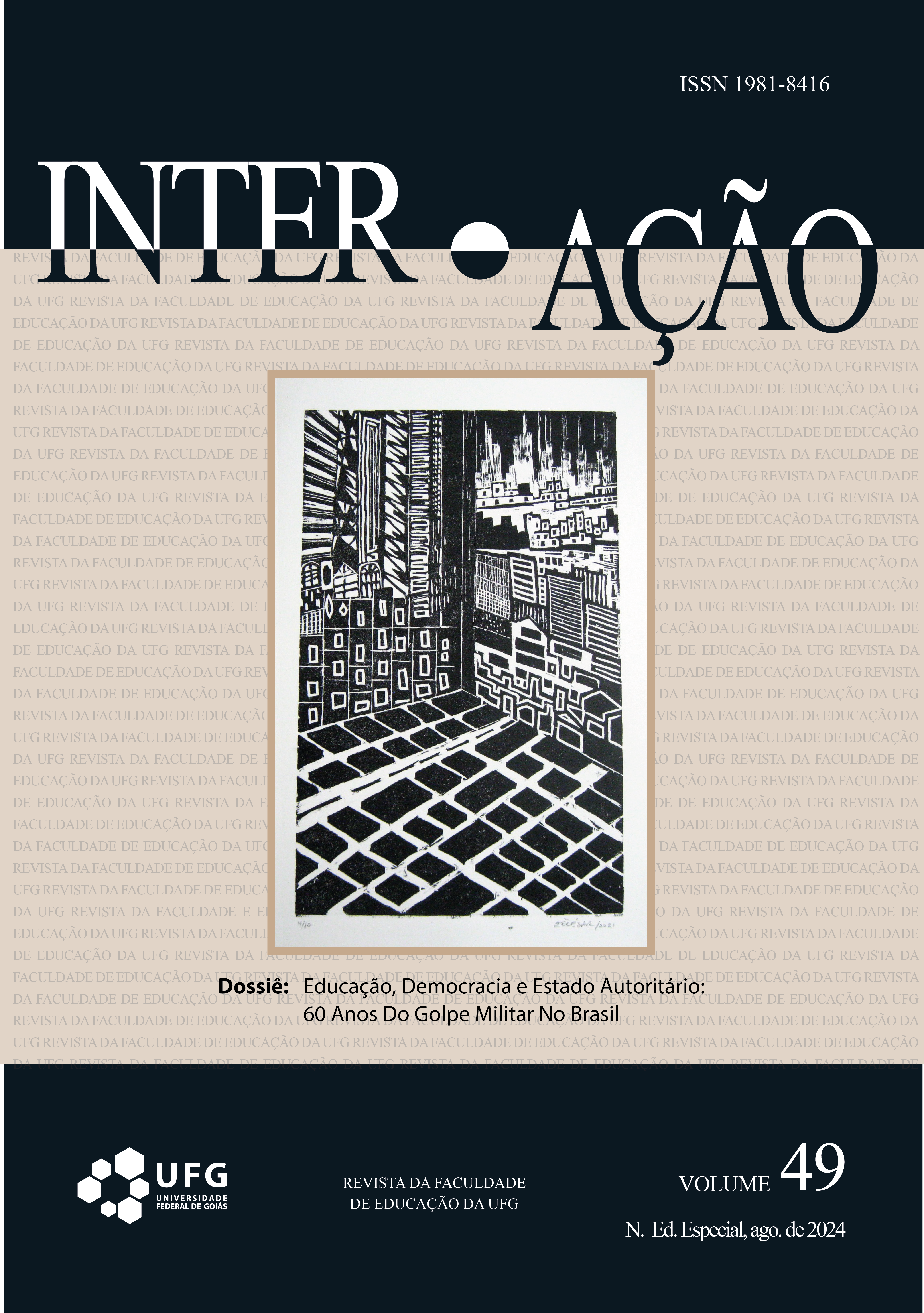THE SCHOOL LIKE AS NA OPERATIONAL MEANS OF THE BRAZILIAN CIVIL-MILITARY DICTATORSHIP
DOI:
https://doi.org/10.5216/ia.v49ied.especial.79057Keywords:
Civil-Military Dictatorship. School. Textbook.Abstract
In the second half of the 20th century, Brazil entered a Civil-Military Dictatorship (1964-1985), and, in that context, the school remained one of the operational means of ideological and discursive strengthening at the time. Thus, the text aims to discuss the school as one of the means of operationalizing and strengthening the ideology of the Brazilian Civil-Military Dictatorship, taking Michael Foucault's discourse as a category, and the records published in textbooks of the period as materiality. To elaborate the arguments, a dialectical methodology was used, with an analytical-reconstructive procedure and content analysis technique, with the documentary corpus consisting of textbooks used in schools during the period. In its development, the text problematizes school culture and textbooks and concludes that it is possible to perceive evidence of the school as a space for the operationalization of discursive strategies aligned with the dictatorial context.
Downloads
References
ALENCAR, Francisco, CARPI, Lúcia, RIBEIRO, Marcus Venício. História da sociedade Brasileira, 1ª Ed – Rio de Janeiro: Ao livro Técnico. 1979.
BITTENCOURT, Circe. Ensino de História: fundamentos e métodos. 4 ed. São Paulo: Cortez, 2011.
BRASIL. Decreto nº 59.355, de 4 de outubro de 1966. Disponível em: https://www2.camara.leg.br/legin/fed/decret/1960-1969/decreto-59355-4-outubro-1966-400010-publicacaooriginal-1-pe.html
BRASIL. Decreto-lei nº 869, de 12 de setembro de 1969. Dispõe sobre a inclusão da Educação Moral e Cívica como disciplina obrigatória, nas escolas de todos os graus e modalidades, dos sistemas de ensino no País, e dá outras providências. https://www.planalto.gov.br/ccivil_03/decreto-lei/1965-1988/del0869.htm
BRASIL. Lei Nº 8.663, de 14 de junho de 1993. Revoga o Decreto-Lei nº 869, de 12 de dezembro de 1969, e dá outras providências https://www.planalto.gov.br/ccivil_03/LEIS/1989_1994/L8663.htm#art1
CORREIA, A. A. Estudos dirigidos de educação moral e cívica. São Paulo: Ática, 1976.
DORNELLES, Leny Werneck. Pátria e Cidadania: EMC. 4º ano. Rio de Janeiro: Ao Livro Técnico, 1971.
FERREIRA JR, A. BITTAR, M. Jarbas Passarinho, ideologia tecnocrática e ditadura militar. Revista HISTEDBR On-line, Campinas, n.29, p. 3-25, set. 2006.
FILHO, Clóvis Pacheco; MICHALANY, Douglas; NETO, José de Nicola; RAMOS, Ciro de Moura. Curso de Estudos Sociais. São Paulo: Editora Michalany S/A, 1977.
FORQUIN, Jean-Claude. Escola e cultura: as bases sociais e epistemológicas do conhecimento escolar. Trad. Guacira Lopes Louro. Porto Alegre: Artes Médicas, 1993.
FOUCAULT, Michel. A Arqueologia do saber. Rio de Janeiro: Forense, 1986.
FOUCAULT, Michel. Segurança, Território, População: curso no Collège de France (1977-1978). São Paulo: Martins Fontes, 2008.
FOUCAULT, Michel. A ordem do discurso: aula inaugural no Collège de France, pronunciada em 2 de dezembro de 1970/Michel Foucault; tradução de Laura Fraga de Almeida Sampaio. 2 ed. São Paulo: Edições Loyola, 2013.
GARCIA, E. C. Educação moral e cívica na escola de primeiro grau. São Paulo: LISA, 1972.
GUSMAO, Daniele Cristina Frediani; HONORATO, Tony. Ideais de homem civilizado veiculados nos livros didáticos e Educação Moral e Cívica na Ditadura Civil-Militar. História da Educação, Santa Maria, v. 23, e82622, 2019.
HERMIDA, Borges. Compêndios de História do Brasil. São Paulo: Cia. Ed. Nacional, 1973.
JULIA, Dominique. A cultura escolar como objeto histórico. Tradução Gizele de Souza. Revista Brasileira de História da Educação, n. 1, p. 09-43, jan./jun. 2001.
LUCCI, Elian Alabi. TDHB – Trabalho Dirigido de História do Brasil. São Paulo: Saraiva, 1979a.
LUCCI, Elian Alabi. TDMC – 2 O trabalho dirigido de Moral e Civismo – 1º. Grau – 2º. Vol.2: 7ª. ed. São Paulo, 1979b.
MUNAKATA, Kazumi. Livro didático como indício da cultura escolar. História da Educação, Santa Maria, v. 20, n. 50, p. 119-138, dez, 2016.
SCHIMIDT, M. J. Curso de Educação Moral e Cívica. 3. Rio de Janeiro: Livraria AGIR, 1971.
SILVA, Francisco de Assis: BASTOS, Pedro Ivo de Assis. História do Brasil: Colônia, Império e República. São Paulo: Editora Moderna, 1976.
SOUZA Nilson Araújo de; CAMPOS Rosanita Monteiro de. (orgs). Pensamento Nacional-Desenvolvimentista. São Paulo: Anita Garibaldi/Fundação Maurício Grabois, 2021, 616p.
SOUZA, Ari H. de; ARAUJO, Rosi O. Estudos Sociais. Nossa terra nossa gente. São Paulo: IBEP, [197-]. 6ª série.
TAVARES, Alberto de Lyra. O Brasil de minha geração. Mais dois decênios de lutas: 1956/1976. Rio de Janeiro: Biblioteca do Exército, 1977. v. 2.
Published
How to Cite
Issue
Section
License
Copyright (c) 2024 Rosimar Serena Siqueira Esquinsani, Sidinei Cruz Sobrinho

This work is licensed under a Creative Commons Attribution-NonCommercial 4.0 International License.
Inter-Ação uses the Creative Commons Attribution 4.0 License for Open Access Journals (Open Archives Initiative - OAI) as the basis for the transfer of rights. Open access means making documents available on the Internet free of charge, so that users can read, download, copy, distribute, print, search, or link to the full text of documents, process them for indexing, use them as input data for software programs, or use them for any other lawful purpose, without financial, legal, or technical barriers.
Authors publishing in this journal agree to the following conditions:
1) Authors retain copyright and grant the journal the right of first publication, with the work simultaneously licensed under the Creative Commons Attribution License, which permits redistribution of the work with attribution and first publication in this journal.
2) Authors are permitted to enter into additional, separate agreements for non-exclusive distribution of the version of the work published in this journal (e.g., for publication in an institutional repository or as a book chapter), with attribution and first publication in this journal.
3) Authors are permitted and encouraged to publish and distribute their work online (e.g. in institutional repositories or on their home page) at any time before or during the editorial process, as this may generate productive changes as well as increase the impact and citation of the published work.















